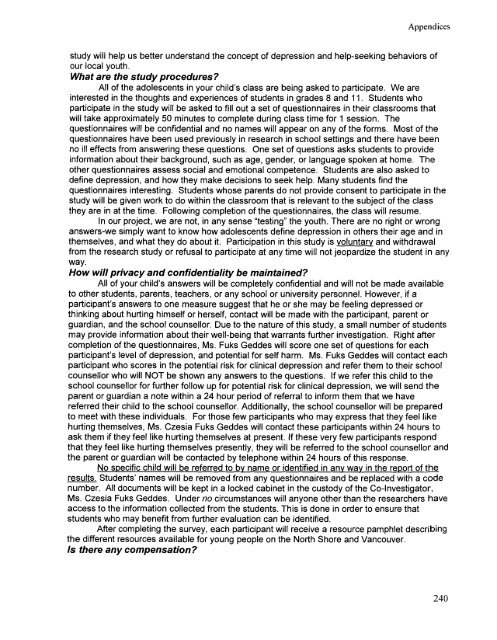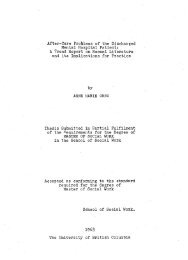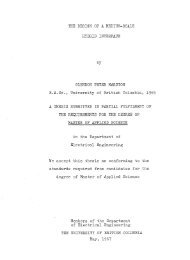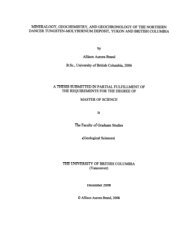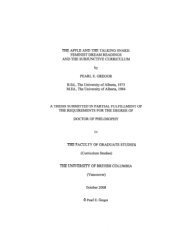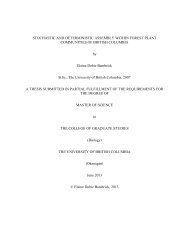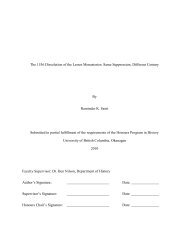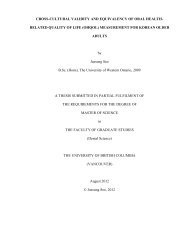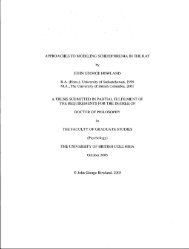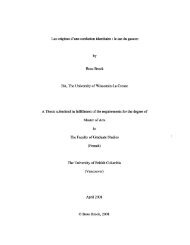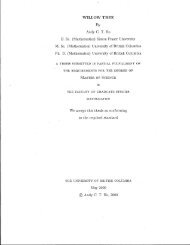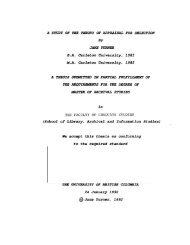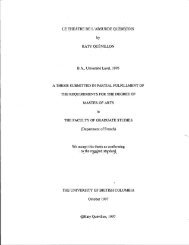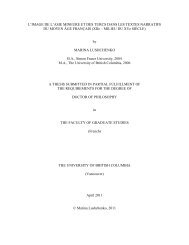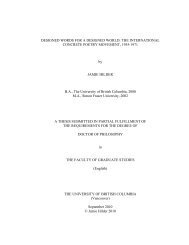how do adolescents define depression? - cIRcle - University of ...
how do adolescents define depression? - cIRcle - University of ...
how do adolescents define depression? - cIRcle - University of ...
You also want an ePaper? Increase the reach of your titles
YUMPU automatically turns print PDFs into web optimized ePapers that Google loves.
Appendices<br />
study will help us better understand the concept <strong>of</strong> <strong>depression</strong> and help-seeking behaviors <strong>of</strong><br />
our local youth.<br />
What are the study procedures?<br />
All <strong>of</strong> the a<strong>do</strong>lescents in your child's class are being asked to participate. We are<br />
interested in the thoughts and experiences <strong>of</strong> students in grades 8 and 11. Students who<br />
participate in the study will be asked to fill out a set <strong>of</strong> questionnaires in their classrooms that<br />
will take approximately 50 minutes to complete during class time for 1 session. The<br />
questionnaires will be confidential and no names will appear on any <strong>of</strong> the forms. Most <strong>of</strong> the<br />
questionnaires have been used previously in research in school settings and there have been<br />
no ill effects from answering these questions. One set <strong>of</strong> questions asks students to provide<br />
information about their background, such as age, gender, or language spoken at home. The<br />
other questionnaires assess social and emotional competence. Students are also asked to<br />
<strong>define</strong> <strong>depression</strong>, and <strong>how</strong> they make decisions to seek help. Many students find the<br />
questionnaires interesting. Students whose parents <strong>do</strong> not provide consent to participate in the<br />
study will be given work to <strong>do</strong> within the classroom that is relevant to the subject <strong>of</strong> the class<br />
they are in at the time. Following completion <strong>of</strong> the questionnaires, the class will resume.<br />
In our project, we are not, in any sense "testing" the youth. There are no right or wrong<br />
answers-we simply want to know <strong>how</strong> a<strong>do</strong>lescents <strong>define</strong> <strong>depression</strong> in others their age and in<br />
themselves, and what they <strong>do</strong> about it. Participation in this study is voluntary and withdrawal<br />
from the research study or refusal to participate at any time will not jeopardize the student in any<br />
way.<br />
How will privacy and confidentiality be maintained?<br />
All <strong>of</strong> your child's answers will be completely confidential and will not be made available<br />
to other students, parents, teachers, or any school or university personnel. However, if a<br />
participant's answers to one measure suggest that he or she may be feeling depressed or<br />
thinking about hurting himself or herself, contact will be made with the participant, parent or<br />
guardian, and the school counsellor. Due to the nature <strong>of</strong> this study, a small number <strong>of</strong> students<br />
may provide information about their well-being that warrants further investigation. Right after<br />
completion <strong>of</strong> the questionnaires, Ms. Fuks Geddes will score one set <strong>of</strong> questions for each<br />
participant's level <strong>of</strong> <strong>depression</strong>, and potential for self harm. Ms. Fuks Geddes will contact each<br />
participant who scores in the potential risk for clinical <strong>depression</strong> and refer them to their school<br />
counsellor who will NOT be s<strong>how</strong>n any answers to the questions. If we refer this child to the<br />
school counsellor for further follow up for potential risk for clinical <strong>depression</strong>, we will send the<br />
parent or guardian a note within a 24 hour period <strong>of</strong> referral to inform them that we have<br />
referred their child to the school counsellor. Additionally, the school counsellor will be prepared<br />
to meet with these individuals. For those few participants who may express that they feel like<br />
hurting themselves, Ms. Czesia Fuks Geddes will contact these participants within 24 hours to<br />
ask them if they feel like hurting themselves at present. If these very few participants respond<br />
that they feel like hurting themselves presently, they will be referred to the school counsellor and<br />
the parent or guardian will be contacted by telephone within 24 hours <strong>of</strong> this response.<br />
No specific child will be referred to by name or identified in any way in the report <strong>of</strong> the<br />
results. Students' names will be removed from any questionnaires and be replaced with a code<br />
number. All <strong>do</strong>cuments will be kept in a locked cabinet in the custody <strong>of</strong> the Co-Investigator,<br />
Ms. Czesia Fuks Geddes. Under no circumstances will anyone other than the researchers have<br />
access to the information collected from the students. This is <strong>do</strong>ne in order to ensure that<br />
students who may benefit from further evaluation can be identified.<br />
After completing the survey, each participant will receive a resource pamphlet describing<br />
the different resources available for young people on the North Shore and Vancouver.<br />
Is there any compensation?<br />
240


